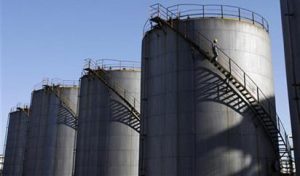Energy
‘Abrupt removal of subsidy will fuel chaos’- oil workers tells Buhari

By Kunle Kalejaye
LAGOS-Petroleum and Natural Gas Senior Staff Association of Nigeria, PENGASSAN has warmed the new government that abrupt removal of fuel subsidy would lead to economic chaos noting that deregulation policy should be based on increase local production refined petroleum products rather than importation.
 The senior staff union argued that if local refining is not increased to meet local demand for petroleum products especially for Premium Motor Spirit, PMS (petrol), removing subsidy on the products will bring more hardship on Nigerians.
The senior staff union argued that if local refining is not increased to meet local demand for petroleum products especially for Premium Motor Spirit, PMS (petrol), removing subsidy on the products will bring more hardship on Nigerians.
In a statement signed by PENGASSAN National Public Relations Officer, Comrade Emmanuel Ojugbana, the association said removing subsidy while the country depends on importation of refined petroleum products will make their prices out of reach for Nigerians thereby causing inflation.
Restating the position of the trade union, Comrade Ojugbana said that importation of refined petroleum products is a major drain on the nation’s revenue, adding that it creates jobs for the refining nations in spite of the high unemployment rate confronting Nigeria.
“Importation of refined petroleum products is also putting the Naira under undue pressure and creating social problems for the economy. This is unacceptable to PENGASSAN.
“Abrupt removal of fuel subsidy will create chaos that may ground the economy. PENGASSAN calls for well-coordinated measures with timeline to achieve self-sufficiency in local refining as a means of proffering acceptable steps to end fuel subsidy.
“This should be combined with such other measures for effective optimization of gas especially for domestic, industrial, electricity and automotive energy. Such will create other affordable and friendly sources for energy needs.”
He therefore called on the government to declare a state of emergency in the downstream oil and gas sector and convene an all-stakeholders forum to come up with concrete and sustainable steps with reliable timeline for achieving demand-supply equilibrium through local refining. The strategy must be to guarantee a total stoppage of both petroleum products importation and fuel subsidy.
He noted that Nigerians expect that relying on the resources that the nation is endowed with; the country should be able to provide refined products at reasonable and affordable prices to the populace, adding that this could have been possible if local refining capacities are enhanced.
Comrade Ojugbana explained that both the government and industry operators had always yearned to promote competition and efficiency but failed to assure on how to enhance local refining capacity to contain local demand.
“Government is thus persistently confronted with import parity pricing and the burden of subsidizing the imported fuel instead of locally refined products. As an important stakeholder in the sector, we oppose the petroleum products importation regime, which is rent seeking and indeed a drain devise that is inimical to our economic and social empowerment.
“It is affecting our self-dependence and means of job creation. Thus, we maintain our unwavering belief in local refining.”
He stated that PENGASSAN strongly subscribe to the retention of the state-owned refineries in the best interest of the Nigerian nation and for economic security, adding that this is in keeping with OPEC’s principle that member countries should hold good grip of the commanding height of their economy.
“PENGASSAN maintains strong objection to the privatization of State-owned Refineries as the OPEC principle is being cautiously guided by other OPEC member countries.”
Energy
SNEPCo, Former MD Aiboni Win Energy Times’ Awards

The Shell Nigeria Exploration and Production Company (SNEPCo) has been named Major Oil Company of the Year for last year by a Nigerian publication, Energy Times.
Biztellers reports that this is in recognition of the company’s contributions to deep-water oil and gas development and the industry generally.
Energy Times also awarded the title of Amazon of Nigeria’s Oil Sector for 2024 to Elohor Aiboni, a former Managing Director of SNEPCo now on international assignment in Brunei.
The awards were presented to SNEPCo’s Senior Operations Manager, Bolanle Odunayo-Ojo, who represented the Managing Director, Ronald Adams at a ceremony attended by key stakeholders in the oil and gas sector.
ALSO READ: BREAKING: Again, Dangote Cuts Petrol Price To N835 per Litre
“We are honored to receive the recognitions for the company and our former Managing Director as they underscore our dedication to excellence in the upstream sector,” Bolanle stated. “The modest achievements are result from teamwork and support by our partners, particularly the Nigerian National Petroleum Company Limited and regulatory agencies. The awards encourage us to continue to work together to power progress and innovation in Nigeria’s energy landscape.”
The SNEPCo has been a pioneer in Nigeria’s deep-water oil and gas production since it began production from Bonga in 2005, Nigeria’s first deep-water well. Gas from Bonga is also piped to Nigeria Liquefied Natural Gas Company Limited at Bonny Island. SNEPCo’s operations have led to significant discoveries, including Bonga Southwest in 2001 and Bonga Northwest, which began production on August 5, 2014.
In its award, the Board of Directors of Energy Times pointed to the continuing success of Bonga, notably production of the 1 billionth barrel of oil in February 2023 and the recent Final Investment Decision on the $5 billion Bonga North project.
The award on Aiboni’s highlights a career that has seen her serve in various business and leadership roles within and outside Nigeria. She was appointed Managing Director of SNEPCo in 2021 and led initiatives that deepened operational efficiency, local content development and social investment projects across the six geopolitical zones in the country.
Energy
Shell Commends Oloibiri Lecture Series As Platform For Change

Shell Nigeria Exploration and Production Company Ltd (SNEPCo,) one of the sponsors of the Oloibiri Lecture Series and Energy Forum (OLEF) has commended it as a platform for driving change in Nigeria’s energy sector through the discussions that centre on business performance, cost discipline and process simplification.
“This event is special to the Shell brand, not only because of the nostalgia of Oloibiri but the quality of discourse it has enabled in our sector over the years,” SNEPCO Managing Director Ronald Adams said in a goodwill speech delivered by General Manager, Wells and Geosciences Operations Joe Mordi. He said: “We are grateful to the Society of Petroleum Engineers and our host the Petroleum Technology Development Fund (PTDF) for another successful outing.”
Organised by the Society of Petroleum Engineers (SPE) Nigeria Council, the Oloibiri Lecture Series and Energy Forum began in 1991, in commemoration of the country’s first commercial oil discovery by Shell at Oloibiri, Bayelsa State, in 1956. Ronald said recent developments in the Upstream and Downstream sectors of the energy industry, including the $5-billion final investment decision by Shell in the Bonga North Deepwater project echoed the sentiments around the first oil discovery.
ALSO READ: No Safety Guarantee For Unscheduled Visitors To Benue – Gov Alia
He noted that, “These strides come with a commitment to excellence required of us – for stakeholders, colleagues, our country and indeed, future generations. The theme for this year ‘Driving energy sustainability through technology, policy and supply chain excellence’ reflects this commitment. The future is bright, and we have the opportunity to co-create it.”
Energy
NLNG Improves Nigeria’s Domestic LPG Supply Efficiency

In line with its continuous improvement culture, the Nigeria LNG Limited (NLNG) will be working closely with its stakeholders to improve operational efficiency in its domestic Liquefied Petroleum Gas (DLPG) supply in Nigeria.
According to a statement from its General Manager, External Relations and Sustainable Development, Sophia Horsfall, this was highlighted at an engagement session with stakeholders in Lagos.
It was gathered that the NLNG plans to enhance engagement and improve operational efficiency of its LPG supply through digitalisation of some of its processes which include a new platform designed to streamline regulatory processes, optimise risk management, and enhance the buyer experience. The platform will feature IT-supported relationship management, automated issue resolution, centralised real-time payments, and improved case management systems, ensuring a seamless supply process despite market shifts and external pressures.
ALSO READ: Ifon-Ilobu Crisis: Adeleke Assures Of Quick Restoration Of Peace
Manager, Commercial Contract Management, NLNG, Tolulope Longe, reiterated that the planned improvements will enable and consolidate NLNG’s resolve to delivering 100% of its LPG supply to the Nigerian market.
She said a strategic roadmap was in play to ensure the achievement of NLNG’s longstanding goals of LPG being accessible and available in the country, aligning with its vision of being a globally competitive energy company, improving lives sustainably. She also harped on the significance of these improvement initiatives and the Company’s push for LPG utilisation as a clean energy source alternative to kerosene and other fossil fuels
Longe noted that the Company remained focused on growth and sustainability of the LPG market by continuously enhancing its supply processes in collaboration with offtakers. She stressed NLNG’s commitment to collaborating with stakeholders to maintain pricing stability and long-term market viability. While acknowledging industry concerns, she noted the importance of operational efficiency in meeting market demands.
NLNG aims to strengthen stakeholder engagement and improve market efficiency in the LPG sector through enhanced customer interactions, minimised schedule disruptions, timely confirmations and deliveries, and prioritisation of customers with demonstrable capacity. As it adapts to market realities, NLNG remains committed to driving sustainability and delivering lasting value to Nigerians.

















